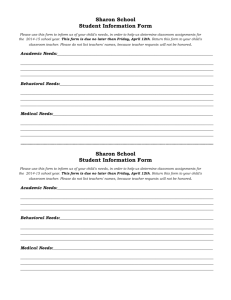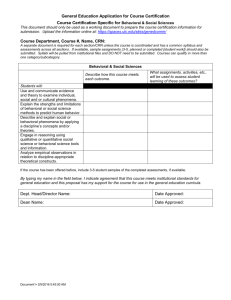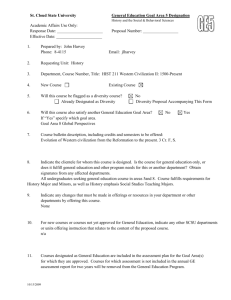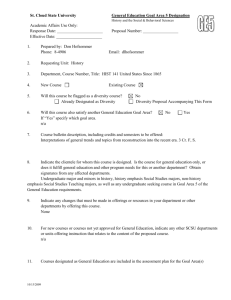SPED 6761-01
advertisement
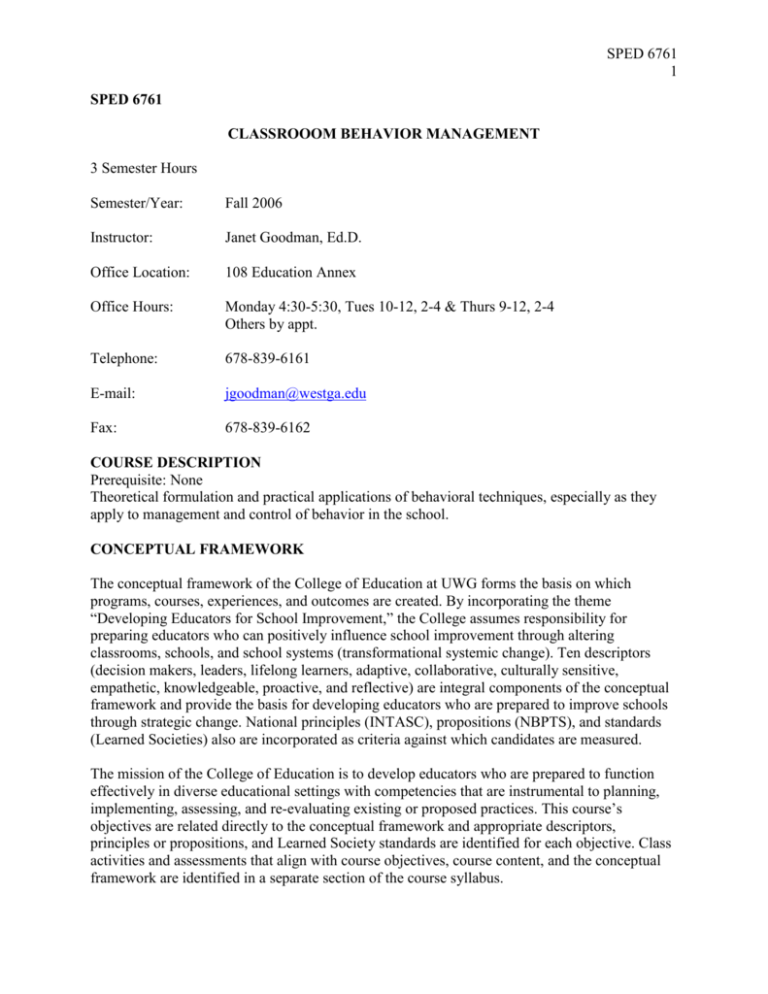
SPED 6761 1 SPED 6761 CLASSROOOM BEHAVIOR MANAGEMENT 3 Semester Hours Semester/Year: Fall 2006 Instructor: Janet Goodman, Ed.D. Office Location: 108 Education Annex Office Hours: Monday 4:30-5:30, Tues 10-12, 2-4 & Thurs 9-12, 2-4 Others by appt. Telephone: 678-839-6161 E-mail: jgoodman@westga.edu Fax: 678-839-6162 COURSE DESCRIPTION Prerequisite: None Theoretical formulation and practical applications of behavioral techniques, especially as they apply to management and control of behavior in the school. CONCEPTUAL FRAMEWORK The conceptual framework of the College of Education at UWG forms the basis on which programs, courses, experiences, and outcomes are created. By incorporating the theme “Developing Educators for School Improvement,” the College assumes responsibility for preparing educators who can positively influence school improvement through altering classrooms, schools, and school systems (transformational systemic change). Ten descriptors (decision makers, leaders, lifelong learners, adaptive, collaborative, culturally sensitive, empathetic, knowledgeable, proactive, and reflective) are integral components of the conceptual framework and provide the basis for developing educators who are prepared to improve schools through strategic change. National principles (INTASC), propositions (NBPTS), and standards (Learned Societies) also are incorporated as criteria against which candidates are measured. The mission of the College of Education is to develop educators who are prepared to function effectively in diverse educational settings with competencies that are instrumental to planning, implementing, assessing, and re-evaluating existing or proposed practices. This course’s objectives are related directly to the conceptual framework and appropriate descriptors, principles or propositions, and Learned Society standards are identified for each objective. Class activities and assessments that align with course objectives, course content, and the conceptual framework are identified in a separate section of the course syllabus. SPED 6761 2 COURSE OBJECTIVES Students will: 1. acquire an understanding of the broad area of behavior management with traditional and multicultural exceptional students (Alberto & Troutman, 2006; Kerr & Nelson, 2005; Jones & Jones, 2004; Zirpoli, 2005) (D6 Culturally Sensitive, D8 Knowledgeable, D10 Reflective; NBPTS* 3; NBPTS-EN* 1, 2, 4, 8, 9, 10, 11, 12, 13, 14; CEC CC* 1, 2, 3, 4, 5, 6, 7, 8, 9, 10); 2. examine different management systems appropriate for classroom implementation with traditional and multicultural exceptional students (Jones & Jones, 2004; Kerr & Nelson, 2005; Zirpoli, 2005) (D3 Lifelong Learners, D4 Adaptive, D5 Collaborative, D6 Culturally Sensitive, D8 Knowledgeable, D10 Reflective; NBPTS 3, 4, 5; NBPTS-EN 1, 2, 4, 5, 8, 9, 10, 11, 12, 13, 14; CEC CC* 1, 3, 4, 5, 8, 9, ); and 3. demonstrate knowledge of alternative management systems and their practical applications in regular and special education classrooms (Kerr & Nelson, 2005; Jones & Jones, 2004; Zirpoli, 2005) (D5 Collaborative, D6 Culturally Sensitive, D7 Empathetic, D8 Knowledgeable, D10 Reflective; NBPTS 3, 5; NBPTS-EN 1, 2, 3, 4, 6, 8, 9, 10, 11, 13, 14; CEC CC* 4, 5, 7, 8, 10). *CEC CC refers to the CEC Common Core of Knowledge and Skill Standards for Beginning Special Education Teachers of Students with Special Needs; NBPTS refers to the National Board for Professional Teaching Standards; and NBPTS-EN refers to the National Board for Professional Teaching Standards - Exceptional Needs. TEST, READINGS, AND INSTRUCTIONAL RESOURCES Required Text: Zirpoli, T. J. (2005) Behavior management: Applications for teachers (4th ed.). Upper Saddle River, NJ: Merrill/Prentice Hall. References: Alberto, P. A., & Troutman, A. C. (2006). Applied behavior analysis for teachers (7th ed.). Upper Saddle River, NJ: Merrill/Prentice-Hall. Breen, M.J. & Fiedler, C.R. (Eds.) (2003). Behavioral approach to assessment of youth with emotional/behavioral disorders: A handbook for school-based practitioners (2nd ed.). Austin, TX: Pro-ed. Brooks, B.L. & Sabatino, D.A. (Eds.) (1996) Personal perspectives on emotional disturbance/behavioral disorders. Austin, TX: Pro-ed. SPED 6761 3 Jones, V.F., & Jones, L.S. (2004). Comprehensive classroom management: Creating Positive learning environments for all students (7th ed.). Boston: Ally & Bacon. Kauffman, J. M., Mostert, M. P., Trent, S. C., & Hallahan, D. P. (2006). Managing classroom behavior: A reflective case-based approach (3rd ed.). Boston: Allyn & Bacon. Kazdin, A. E. (2001). Behavior modification in applied settings (6th ed.). Belmont, CA: Wadsworth. Koegel, L. K., Koegel, R. L., & Dunlap, G. (1996). Positive behavioral support: Including people with difficult behavior in the community. Baltimore: Brookes. Kerr, M. M. & Nelson, C. M. (2006). Strategies for addressing behavior problems in the classroom (5th ed.). Upper Saddle River, NJ: Merrill/Prentice Hall. Lee, C. (1997). Behavior management: Keeping up with the times. Learning. 25(4), 28-34. Luiselli, J. K., & Cameron, M. J. (1998). Antecedent control: Innovative approaches to behavioral support. Baltimore: Brookes. Simpson, R.L. (1996). Working with parents and families of exceptional children and youth: Techniques for successful conferencing and collaboration (3rd ed.). Austin, TX: Pro-ed. Zionts, P. (1996). Teaching disturbed and disturbing students (2nd ed.). Austin, TX: Pro-ed. Zirpoli, T. J., & Melloy, K. J. (2005). Behavior management: Applications for teachers (4th ed.). Upper Saddle River, NJ: Merrill/Prentice Hall. Recommended Journals: Behavioral Disorders Developmental Psychology Education and Training in Developmental Disabilities Educational Leadership Exceptional Children Focus on Exceptional Children Intervention in School and Clinic Journal of Abnormal Child Psychology Journal of Applied Behavior Analysis Journal of Educational Psychology Journal of Emotional and Behavioral Disorders Journal of Learning Disabilities Journal of School Psychology Journal of Special Education Learning Disabilities Research and Practice Teacher Education and Special Education Teaching Exceptional Children ASSIGNMENTS, EVALUATION PROCEDURES, AND GRADING POLICY Link to Conceptual Framework This course focuses on the theoretical formulation and practical applications of behavioral techniques specifically for the management and control of behavior in schools. The overall evaluation for this course consists of observation of candidate participation in in-class discussions as well as formative evaluations of examinations and written products. All candidates are required to demonstrate their ability to effect positive child change through the development, implementation, and evaluation of a child-change project. At the completion of the SPED 6761 4 course, candidates will have demonstrated competence in the areas of lifelong learners: be active problem solvers to assist their students by providing appropriate behavioral interventions and understand the importance of remaining current in the field to remain aware of and competent in best practices (assignments 1, 2, 3, 4); adaptive: demonstrate flexibility and strategic planning appropriate to a wide variety of learners for effectively meeting students’ behavioral needs (assignments 2, 3, 4); collaborative: develop skills to work effectively with various other professionals involved in the processes required for addressing the behavioral needs of students (assignments 1, 2, 3, 4); culturally sensitive: develop awareness and understanding of individual and group differences when diagnosing and prescribing for behavioral needs (assignments 2, 3, 4); empathetic: develop the sensitivity for individual, family, and institutional needs that will most effectively meet the behavioral needs of students (assignments 2, 3, 4); knowledgeable: demonstrate a specific knowledge of functional behavior assessment and behavioral intervention techniques (assignments 2, 3, 4); and reflective: demonstrate reflective, critical thinking skills in order to effectively plan and implement appropriate behavioral intervention techniques (assignments 1, 2, 3, 4). Assignments: 1. Journal Article Critiques: (4 @ 10 points each, 40 points total) Students will read and critique four (4) articles related to behavior modification or behavior management. Article must be recent (i.e., within the past 5 years, 2001-2006) and published in professional journals. Each critique should include a) a brief summary of the content of the article, b) a paragraph on how it is applicable to special education and/or your classroom, and c) your interpretation, reactions, comments, and analysis of the article (this should make up the major portion of the critique). You must complete at least one critique for each of the following topics: Functional Behavior Assessment Positive Behavior Support Behavior Intervention Plans Your choice (behavioral focus) This is the suggested order, but you can do them out of order if you would like. The critique should be a minimum of one page and a maximum of two pages, and should follow APA 5th edition guidelines. (Objectives 1-3; rubric) 2. Behavior Change Project: (50 points) Students will demonstrate knowledge of course material by designing a behavior change project. The plan should be based on a behavior observed in your classroom or other current environment. Plans will include goal(s), specific behavioral objective(s), assessment technique(s), and intervention(s). This assignment will include the collection of baseline data, the implementation of an intervention, and the collection of data, graphing of data, and analysis/evaluation of data. The plan will follow one of the single-subject research designs described in the text and/or class. The written document is to include the following sections: SPED 6761 5 Participant characteristics – age; educational background; other relevant background information; and physical, academic, and social levels. II. Long-term goals and short-term objectives (the latter written in behavioral terms). III. Description of baseline behavior (i.e. current level) and hypothesis of function of the behavior (escape or attention). IV. A written description of the intervention, which is to include copies or pictures of any materials used (this is a description of the procedure) V. Written description of how the individual responded to the intervention VI. Evaluation/analysis/reflection – evaluate the program’s effectiveness, give suggestions for future use, describe what you learned, what you might do to help the person maintain behaviors and what you would do differently if you were to do it again, or if it didn’t work this time. VII. Graphic representation – a sample graph depicting the appropriate format will be distributed. (Objectives 1-3; rubric) I. 3. 5 Weekly quizzes: (20 points) The lowest quiz grade will be dropped. Quizzes cannot be made up, if you miss one, that will be the one dropped. Format will include multiple choice, true/false, short answer, matching, and analysis/application questions. Material will include text, class discussion and assignments, and lecture. (Objectives 1-3; exam key) 4. Midterm & Final Exam: (50 points each) Will include multiple choice, true/false, short answer, matching, and analysis/application questions. Material will include text, class discussion and assignments, and lecture. MIDTERMS AND FINALS WILL ONLY BE GIVEN ON THE EXAM DATE, make sure you are in class to take them. (Objectives 1-3; exam key) Evaluation Procedures: Assignment/Activity Journal Article Critiques Points 10 10 10 10 Behavior Management Plan Rubric 50 Quizzes Exam key 3@ 20 (lowest score dropped) =60 Midterm Final Exam Assessment Tool Rubric Exam key Total Points Possible Due Date 9/11/06 9/25/06 10/23/06 11/13/06 11/20/06 8/26/06 9/18/06 11/06/06 11/20/06 50 10/02/06 50 12/04/06 250 SPED 6761 6 Grading Policy: A = 225-250 B = 200-224 C = 175-199 F = <174 CLASS POLICIES 1. WebCT is a supplement to this course and will be used to access email, grades, notes, assignments and on-line sessions. A brief overview will be done in class, if you need further assistance contact the distance learning center. 2. Attendance is expected. In-class assignments will be done that directly reflect exam questions. Two tardies and/or leaving early will count as one absence. 3. Late assignments will NOT be accepted. If there is an emergency, the grade on the late assignment will be dropped by 10% each day, ie. one week late equals 70% reduction in grade, therefore emailing your assignment as an attachment BY 5:00 p.m, or putting in assignment drop box on WebCT Vista the day it is due would be the best way to avoid a reduction in the grade. 4. Each student is to come to class prepared. This includes having the text available and having done the assigned readings for that day and any other assignments. 5. Student work will be returned as promptly as possible, but if you are absent when the work is handed back, you must pick up your work at the instructor’s office. 6. Students who miss class (or any portion of class) are responsible for the content, including any announcements. Any student who misses class has the responsibility for obtaining copies of notes, handouts, assignments, etc. If additional assistance is necessary, an appointment should be scheduled with the instructor. 7. Submission of work taken directly from another source (e.g. lesson plan copied from a book, the internet, or material developed by another student) will be considered plagiarism and grounds for no credit on the assignment. However, students are encouraged to use a variety of resources in obtaining ideas and illustrations to help complete assignments. See the APA Guide for the correct methods for citing other authors’ work. 8. It is not appropriate or acceptable to submit for credit an assignment, project, or paper that was submitted for credit in another class without prior approval from the instructor. 9. Students are not to bring guests to class, no exceptions. ACADEMIC HONESTY Students are expected to adhere to the highest standards of academic honesty. Plagiarism occurs when a student uses or purchases ghost-written papers. It also occurs when a student utilizes the ideas of or information from another person without giving credit to that person. If plagiarism or another act of academic dishonesty occurs, it will be dealt with in accordance with the academic misconduct policy as state in The Uncatalog, Undergraduate Catalog, and Graduate Catalog. SPED 6761 7 COURSE OUTLINE Date Topic and assigned reading (READ CHAPTER BEFORE CLASS) 8/14/06 Review syllabus and course requirements, Foundations for understanding a managing behavior, chapter 1 8/21/06 Formal behavioral assessment and functional behavior assessment, chapters 2 & 6 8/26/06 Data collection techniques, chapter 3 APA format review 9/04/06 Labor Day, NO CLASS 9/11/06 Single-subject design, chapter 4 9/18/06 Curriculum-based assessment: the relationship between classroom curriculum and student behavior, chapter 5 9/25/06 Positive Behavior Support (PBS), handout Assignments Due For class and for behavior change project Quiz 1 (Ch. 1, 2, 6) Hypothesis for behavior change, target behavior and operational definition Critique #1 Data collection sheet Design being used and intervention Quiz 2 (Ch. 3,4) Critique #2 Baseline data 10/02/06 MIDTERM 10/09/06 NO CLASS/Fall break 10/16/06 Establishing a reinforcement program, chapter 7 10/23/06 Cognitive behavior modification, chapter 8 10/30/06 Behavior reduction strategies, chapter 9 Critique #3 Intervention data 11/06/06 Specific behavior challenges, chapter 10 Quiz 3 (ch. 7, 8, 9) 11/13/06 Disciplining students: legal issues for schools and Adolescent behavior issues, chapters 11 & 13 Critique #4 11/20/06 Special considerations: early childhood and cultural and family issues, chapters 12 & 14 Quiz 4 (ch. 10, 11, 13) Behavior change projects DUE Presentations 11/27/06 Final exam review & behavior change project presentations 12/04/06 FINAL EXAM SPED 6761 8
